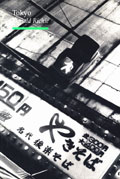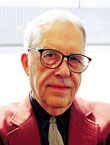| Japan Reading: Tokyo: A View of the City | ||||
|
Tokyo: A View of the City by Donald Richie Reaktion Books, London 1999, 143 pages This is the first book I've read by Donald Richie about Japan. It's a short thing, easy to pick up and breeze through in a day or two. Since I'd already lived in Tokyo for a few months, this text was like meeting a very smart friendly professor who had been to all the places I'd been meaning to go, and looked up the history, and compressed it all for me into lively chunks. Richie has lived in Tokyo for almost all of the last 50 years, and he acknowledged the world around as one of the foreigners most well-versed in this culture. This book is a short version of what is a career of writing about Japan, Japanese people, and Japanese culture. He explains Tokyo, starting from the grand but powerless castle in the center; the one place where traffic stops. He follows the path of history as Japanese merchants wander convenient cowtrails, streams and paths in concentric circles around this castle, marking Tokyo's expanding borders. Richie seems to bear a special place in his heart for the pleasure quarters. Many of these pages are spent examining the human history reflected in Asakusa, in Shinjuku. He writes as someone who seems to have cheap octopus under his fingers, beer on his breath, and a few less yen in his pocket from having sampled some the sex shows. But always he is quoting liberally from old Japanese and Western texts, as well as the contemporary media surrounding him. And his first person journals written during his many decades in Tokyo. This is really stellar stuff - he is clearly a rare combination of an enlightened person, a thorough student, and a talented writer. That he should make Tokyo his subject is almost beside the point, this is pleasurable reading regardless. But if I am going to explore Japan I look forward to reading as much of Richie's texts as I can get my hands on. Reading it is somehow both exhilarating and discouraging - it seems he has already overturned every rock I've seen in Tokyo, and seen what's underneath it in light of aeons of history. There is wisdom here so compressed; it reflects a serious length and depth of experience. I had mused over the fate of men sleeping in Ueno park; Richie explains the situation in one dense sentence: "The homeless are not housed because the family always looked after its own but now it doesn't." (page 136). Still he does not hoard Tokyo; he sees it as wildly diverse, and ever-changing, and he would be the first to say that there is infinite exploration still possible. Towards the end of the book he ventures into nostalgia, citing declining standards of civility and tradition. It sounds similar to Alex Kerr, in the tradition of foreigners holding culture to a higher standard than the locals. "Convenience is ultimately stronger than tradition," Richie observes, after decrying permissible eating in public and mobile phone use (p136). But as he cites the crowding out of old Tokyo, he feels out that "something remains" and the book ends with a journal entry of him wandering Ueno Park, seeing Japanese folks wearing their summer traditional garb. He looks into the future and he sees in another man such as himself who will similarly decry the more pleasurable old days, which are just now commencing.
Links (December 2001)
|

| |||
| ||||
Japan Books | bukz | ritteds
justin's links by justin hall: contact
